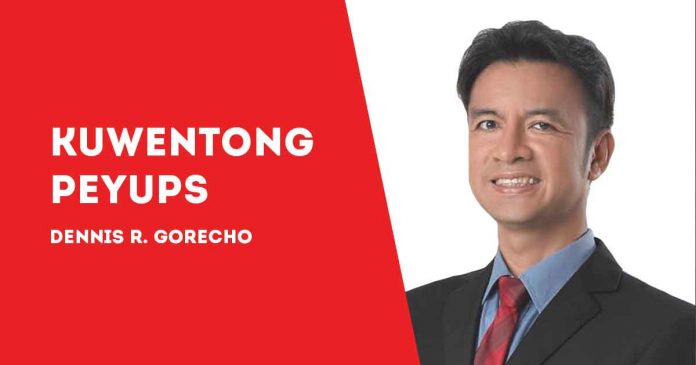
MACLI-ING Dulag was among the most well-known of the many victims of Martial law under then president Ferdinand Marcos.
Macli-ing was a pangat (leader) of the Butbut tribe of Kalinga who opposed the government plan to construct a 1,010 megawatts dam project covering the Chico River.
Despite the lack of a formal education, Macli-ing knew that the project will eventually displace thousands of his people from their ancestral lands and destroy millions worth of fruits, vegetables, and grains.
Macli-ing was killed on April 24, 1980 by government forces in an attempt to silence him, but his murder was a catalyst that united the peoples of the Cordillera in opposing the dam.
One of his famous quotes on the people’s reverence for the land, affirming their right to stay, states: “You ask if we own the land and mock us saying, ‘Where is your title?’ When we ask the meaning of your words you answer with taunting arrogance, ‘Where are the documents to prove that you own the land?’ Titles? Documents? Proof of ownership. Such arrogance to speak of owning the land when we instead are owned by it. How can you own that which will outlive you? Only the race owns the land because the race lives forever.”
My former UP Law professor and now Supreme Court Associate Justice Marvic Leonon cited Macli-ing’s words in his concurring opinion in Sama vs People (G.R. No. 224469, Jan. 5, 2021) that the Iraya-Mangyans should be acquitted of the crime charged for violating the Revised Forestry Code after they cut down a Dita tree without a license or permit issued by the proper authority.
The Iraya-Mangyans invoked their Indigenous Peoples’ (IP) right to harvest Dita tree logs, which constituted a part of their right to cultural integrity, ancestral domain, and ancestral lands. They insisted that the felled Dita tree was planted in their ancestral domain, over which the Iraya-Mangyans exercise communal dominion.
The Indigenous Peoples Rights Act (IPRA), or Republic Law 8371, was enacted in 1997 to support the cultural integrity of IPs, the right to their lands and the right to self-directed development of these lands.
Leonen underscored that the concept of ownership introduced by IPRA is distinct in the sense that, unlike the Civil Code that puts emphasis on individual and corporate holders, IPRA stresses the private but communal nature of ancestral domains.
IPRA recognizes that IPs have a claim of ownership, not only upon the ancestral domain, but also on the resources found in them. It acknowledges that the ancestral domain and the resources located therein constitute the IPs’ basis for their cultural integrity.
“The indigenous peoples’ struggle for their rights has long been enduring. Their struggle for the recognition of their rights to land and self-determination is rooted in their effort for cultural and human survival. We should honor the struggle of our people. This decision is the least we can do to correct a historical injustice,” Leonen said.
The number of IPs in the Philippines is unknown, but it is estimated that they consist between 10% and 20% of the country’s population and they have retained much of their traditional, pre-colonial culture, social institutions and living practices.
Most of the IPs continue to live in geographically isolated areas with lack of access to basic social services and few opportunities for widespread economic activities, education or political participation.
“Katutubo sa Senado” is the campaign slogan of Teddy Baguilat Jr., a member of the Liberal Party, a known politician-activist and advocate of IP rights and the rights of minority groups.
A native of Ifugao in the Cordillera mountain range, he was first elected as a lawmaker in 2010. Prior to this, he served as Ifugao governor for two terms and as mayor of Kiangan town.
I was with Baguilat in Kiangan’s “Gotad”, which is an Ifugao term for celebration, or large gathering for thanksgiving. It features, among others, the cultural ethnic sports competition.
We belong to opposing student political parties in UP Diliman. Teddy was with Nagkaisang Tugon, while I belonged to SAMASA.
During his term as congressman, he supported several bills involving IPs, including the Indigenous Education bill that mandates the use of indigenous education in all indigenous communities in the country; the Indigenous Barangay bill, which aims to establish full-fledged barangays where indigenous communities are present; and other bills focusing on indigenous rights.
If given the chance to be the first IP to become a senator, Baguilat will push for the passage of the Land Use Act, a new mining law, and sustainable forest management.
Electing a deserving representative of our IPs is long overdue.
Baguilat will carry the voices of our indigenous peoples in the Senate.
***
“Peyups” is the moniker of the University of the Philippines.
***
Atty. Dennis R. Gorecho heads the seafarers’ division of the Sapalo Velez Bundang Bulilan law offices. For comments, e-mail info@sapalovelez.com, or call 0917-5025808 or 0908-8665786./PN

